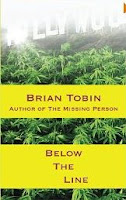
Title: Below The Line
Author: Brian Tobin
Genre: novel
Price: $14.99 (paperback) / $3.99 (Kindle)
Publisher: Createspace
ISBN: 978-1463684976
Point of Sale: Amazon
Reviewed by: Chris Gerrib
There’s a type of crime novel that is best described as “a simple plan.” It’s where a group of people come up with a simple criminal plan to make a bunch of money and nobody will get hurt. The plot then revolves around watching this simple plan go seriously wrong, usually due to the greed, incompetence and general bad luck of the main characters. Brian Tobin’s new novel Below The Line is an enjoyable entry into that genre.
The novel is set in 1993 Los Angeles, and stars a cast of characters not exactly out of Central Casting. The closest character to a hero is Peter “Squeak” Bartholomew, a ne’er do-well from a small town in Upstate New York. He’s got family problems and money problems, the solution to which comes to him from his buddy Martin Oals. Martin, Squeak’s childhood buddy, moved out to LA and became an actor. Alas for Martin, not a very famous or wealthy actor, one who’s career peaked with “also appearing” roles in movies and TV series, and those had largely dried up. So, Martin had taken to dealing drugs, selling same to his collection of Hollywood contacts, including one Joel Opatkin, a studio VP with delusions of grandeur and a cash problem. A decision to migrate from sales to production, funded by Opatkin on borrowed money, is the simple plan that leads everybody to disaster.
Brian Tobin, the author, lives in Los Angeles, and for this his 4th novel (including two from St. Martin’s Press) he vividly incorporates the movie business into this novel. The novel’s title refers to an imaginary line in movie-making. Everybody “below the line” handles the details of actually making the movie, while those “above the line” have creative control. In this book, everybody is below the line, in that they really have very little creative control over their lives.
Having said that the characters have no control, they are both believable and (by their lights) reasonable. This is of course the beauty of the “simple plan” – it really shouldn’t be that hard to do what they are trying to do. But Murphy (or in this case author Tobin) is alive and well, making things difficult. I have to say that I found Below The Line an enjoyable romp through the mid-1990s.
Rating 8/10





